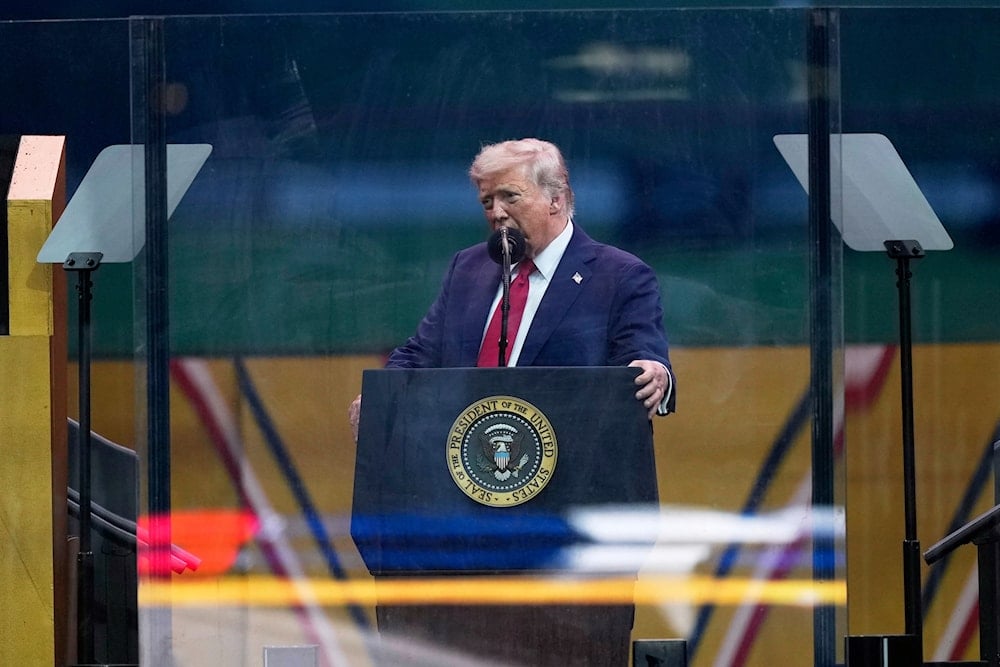Trump admin may expand travel ban to 36 nations
A leaked cable reveals Trump’s plan to expand US travel bans, targeting 36 countries over identity and security concerns amid a broader immigration push.
-

US President Donald Trump speaks at a military parade commemorating the Army's 250th anniversary Saturday, June 14, 2025, in Washington. (AP)
The administration of US President Donald Trump is reportedly exploring a substantial expansion of its travel restrictions, according to an internal State Department cable obtained by Reuters.
This directive was part of a broader immigration crackdown initiated by Trump at the beginning of his second term, which has involved deporting hundreds of Venezuelans accused of gang ties to El Salvador, along with measures to block certain foreign students from enrolling in US universities and to deport others.
In a confidential diplomatic cable signed by US Secretary of State Marco Rubio, the State Department detailed numerous concerns regarding the countries under consideration while demanding corrective measures.
"The Department has identified 36 countries of concern that might be recommended for full or partial suspension of entry if they do not meet established benchmarks and requirements within 60 days," the memo cited by Reuters stated.
The cable stated that among the State Department's concerns were some countries' inability or unwillingness to provide reliable identity documents due to ineffective or uncooperative governments, as well as issues regarding the security integrity of certain nations' passport systems.
The memo further highlighted concerns regarding nationals from specific countries allegedly involved in terrorist activities on US soil, as well as engagement in "antisemitic" and anti-American behavior, though the cable emphasized that these issues were not universally applicable across all nations being reviewed.
The countries that could face a partial or complete ban within the next 60 days are: Angola, Antigua and Barbuda, Benin, Bhutan, Burkina Faso, Cabo Verde, Cambodia, Cameroon, Cote D'Ivoire, Democratic Republic of Congo, Djibouti, Dominica, Ethiopia, Egypt, Gabon, The Gambia, Ghana, Kyrgyzstan, Liberia, Malawi, Mauritania, Niger, Nigeria, Saint Kitts and Nevis, Saint Lucia, Sao Tome and Principe, Senegal, South Sudan, Syria, Tanzania, Tonga, Tuvalu, Uganda, Vanuatu, Zambia, and Zimbabwe.
Earlier this month, the Republican president issued a proclamation barring citizens from 12 countries from entering the United States, justifying the measure as necessary to safeguard against what he described as "foreign terrorists" and other potential threats to national security.
Trump's travel restriction on 12 countries goes into effect
The earlier travel restrictions implemented by Donald Trump took effect at midnight on June 9, imposing entry bans or limitations for nationals from Afghanistan, Chad, Equatorial Guinea, Eritrea, Haiti, Iran, Libya, Myanmar, the Republic of the Congo, Somalia, Sudan, and Yemen, while implementing partial travel limitations for nationals from seven other countries such as Burundi, Cuba, Laos, Sierra Leone, Togo, Turkmenistan, and Venezuela.
Legal analysts have observed that while Trump's original 2017 executive order faced widespread criticism as a "Muslim ban" and underwent court-ordered revisions, the current directive adopts a more expansive approach with carefully constructed wording designed to potentially withstand comparable legal challenges.
In a social media video posted Wednesday, Trump defended the ban as a national security measure, arguing that many of the affected countries have weak screening systems or refuse to repatriate citizens.

 3 Min Read
3 Min Read








